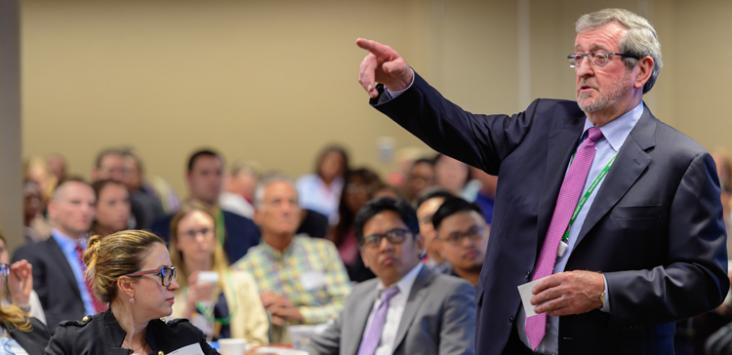NorthWell Health CEO Encourages the Need for Interdisciplinary Medical Education & Simulation
Recently on Northwell Health’s website the group’s President and CEO Michael J. Dowling explored the need for interdisciplinary medical education over the “the purely clinical focus our medical schools have cultivated for decades.” He encourages us to consider the opportunities of creating better prepared medical students by creating new cross-over degrees connected to other fields like business or law. Of course, he also recommends the immediate utilization of “experiential learning” found from simulated experiences in an age where “Dr. Google” has made “memorization” a “waste of time”.
Northwell Health is the largest integrated health care system in New York State with a total workforce of more than 66,000 employees — the state’s largest private employer. With 23 hospitals, 6,675 hospital and long-term care beds, more than 665 outpatient physician practices and a full complement of long-term care services, Northwell is one of the nation’s largest health systems, with $11 billion in annual revenue. As CEO of such a massive healthcare system, certainly Mr. Dowling has the experience to back up his powerful perspective.
With patient demographics shifting nationwide and new technologies transforming how care is delivered, medical education has yet to receive the thorough review required to keep pace with the dramatic changes affecting our industry. Michael J. Dowling
Sponsored Content:
An Excerpt From Mr. Dowling’s Article on The Need for Evolving Medical Education:
Medical schools offering a mix of programs that include business, law, molecular medicine and other advanced degrees in conjunction with medical degrees will continue to become more appealing and diverse in the coming years, as physicians of the future seek more options for professional growth. Of course, diversity not only relates to a physician’s course of study but to the increasingly diverse patient populations served by providers.
Perhaps the most dramatic mindset shift medical schools must embrace to adapt to a changing industry is to acknowledge that memorization is outmoded. It is unbelievable how much time medical students spend memorizing facts and figures, only to forget many of them when it comes time to learn new material for their next exam. Memorization does not imply understanding, and in an age when Dr. Google holds all the answers in a single click of the mouse, it is a waste of time.
When education focuses solely on the diagnostic or treatment aspects of medicine, physicians are ill-equipped to reconcile that medical care is only one component of health. There are many other factors that contribute to a patient’s overall health, including social determinants, geography, diet and a multitude of other lifestyle choices. To create a well-rounded care plan that keeps patients healthy and out of the hospital, it is imperative for physicians to truly understand how to engage patients and learn about all of the factors that impact the health and wellness of each individual. While technology continues to advance at a dramatic pace, it should never provide a substitute for human contact.
Sponsored Content:
Understanding that the majority of care in the future will take place outside the walls of the hospital, our students gain experience in many different care sites, including ambulatory practices and community health centers, giving them practical experience starting on day one of their education. Instead of multiple-choice exams, students utilize small-group assessments to present cases on an individual basis, then test their skills every 12 weeks at our simulation training center.
Long-established medical schools, some of which have been in existence for more than 200 years, may be hesitant to adopt changes that shake their foundations. Some have become slaves to history and tradition within organizations that move at the lethargic pace of bureaucracy. However, during an era when consumerism is spreading into all areas of health care, traditional medical schools must be mindful of the outside players that are disrupting so many facets of health care. As we have seen with hospitals over the past 15-20 years, if they do not evolve and embrace change, they risk extinction.
Read the Full Article From CEO Mr. Dowling on the Northwell Health Website!
Lance Baily, BA, EMT-B, is the Founder / CEO of HealthySimulation.com, which he started in 2010 while serving as the Director of the Nevada System of Higher Education’s Clinical Simulation Center of Las Vegas. Lance also founded SimGHOSTS.org, the world’s only non-profit organization dedicated to supporting professionals operating healthcare simulation technologies. His co-edited Book: “Comprehensive Healthcare Simulation: Operations, Technology, and Innovative Practice” is cited as a key source for professional certification in the industry. Lance’s background also includes serving as a Simulation Technology Specialist for the LA Community College District, EMS fire fighting, Hollywood movie production, rescue diving, and global travel. He and his wife live with their two brilliant daughters and one crazy dachshund in Las Vegas, Nevada.
Sponsored Content:


















